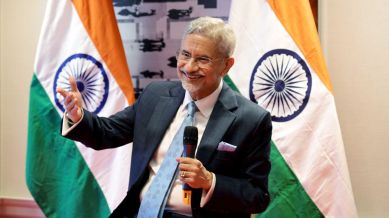Confirming the progress on an interim trade deal between India and the US, External Affairs Minister S Jaishankar has said the government is “hopeful of reaching an agreement before the tariff suspension ends on July 9”.
On April 2, the US announced 26 per cent reciprocal tariffs on Indian goods and later effected a 90-day pause period that ends July 9.
In an interview with French daily Le Figaro, Jaishankar, who is on an official visit to Belgium and France until June 14, said, “The threat of reciprocal tariffs was raised on April 2, but we had already begun bilateral negotiations for a trade agreement.”
“Prime Minister (Narendra) Modi was hosted by (US President) Donald Trump in February, and they agreed to expand access to each other’s markets. We are hopeful of reaching an agreement before the tariff suspension ends on July 9,” he said, responding to a question on Washington’s threat of a 26 per cent tariff, and Delhi’s relations with the Trump administration.
“For over a quarter-century, under five US Presidents, our ties with the US have continuously strengthened. Structural forces – economic, technological, educational, scientific, strategic, military – are driving this relationship,” he said.
From India’s perspective, he said, “we see the US acting in line with its immediate self-interest” with the rest of the world. “To be honest, I would do the same with them,” he said.
In New Delhi Tuesday, US negotiators concluded a nearly week-long visit which was originally slated to be a two-day round of talks on June 5-6.
The two sides, which signed the Terms of Reference (ToR) on April 1, a day before the planned implementation of reciprocal tariffs on April 2, held sector-level discussions in this round of talks.
Story continues below this ad
Tariffs on goods of American interest such as corn, soybeans, nuts, cars, spirits and those of Indian interest such as textiles, footwear, tea, and coffee were discussed, along with the rules of origin which determine whether a product qualifies for preferential tariff treatment.
This round of negotiations is significant because the White House earlier this month wrote to all its trade partners seeking their best offers, with the July 9 deadline for reciprocal tariffs just weeks away.
Moreover, the US is parallelly negotiating a trade agreement with China in London. News agency Reuters reported Tuesday that US Commerce Secretary Howard Lutnick said the trade talks with China were going well as the two sides met for a second day, seeking a breakthrough on export controls that were raised among automobile manufacturers globally, including in India.
Delhi is also expected to increase imports of oil and defence products which will help bridge the trade gap with the US – a concern repeatedly raised by Trump. Official trade data show that India has already increased its oil purchases from the US. India’s import of crude oil from the US rose by 11.49 per cent to $63 billion in March 2025 compared with the previous year.
Story continues below this ad
In the interview with Le Figaro, Jaishankar also spoke at length about the military action between India and Pakistan, and how India views China’s support to Pakistan. He said the issue was actually about terrorism, not Pakistan.
“It has become an India-Pakistan issue because Pakistan harbours and supports terrorists. The conflict is between India and terrorism, not with a specific country,” he said.
This, he said, was not a dispute with Pakistan over Kashmir. “We simply have zero tolerance for terrorism,” he said, adding “if terrorists attack India, we will hunt them down wherever they are, including in Pakistan”.
On being asked about China’s support to Pakistan, he said, “They have had close ties for decades. But on an issue like terrorism, you cannot afford ambiguity or double standards. In the end, it’s a problem that concerns all of us.”
Story continues below this ad
On the future of India’s own ties with China, which have seen a thaw in recent times with the border disengagement and resumption of the Kailash Mansarovar Yatra, Jaishankar said, “Both our powers are rising quickly, so finding balance is a complex process. Our relations have gone through a difficult period since the 2020 military clash in the Himalayas. Many of our exchanges were suspended.”
“The key question for us is: How do we ensure peace and stability in the border areas? Without that, everything else is affected. I believe both sides think relations can improve step by step. We have discussed some measures, and others are under consideration, like the resumption of direct flights suspended since Covid,” he said.
To a question on the Indian society experiencing “internal tensions” regarding its 200-million Muslim minority, Jaishankar said he didn’t agree with the premise of the question and that (perception) is “largely exaggerated, sometimes outright false”.
“When it comes to diversity, we are very different from Europe. Here, nations are typically based on one language, often one religion.
Story continues below this ad
Uniformity is your natural state, and you struggle with diversity. But we have always lived amid diversity. For us, multiple languages, beliefs, ethnicities, and traditions are part of who we are. Religion is only one facet of our identity. That’s why I reject the premise of your question,” he said.
